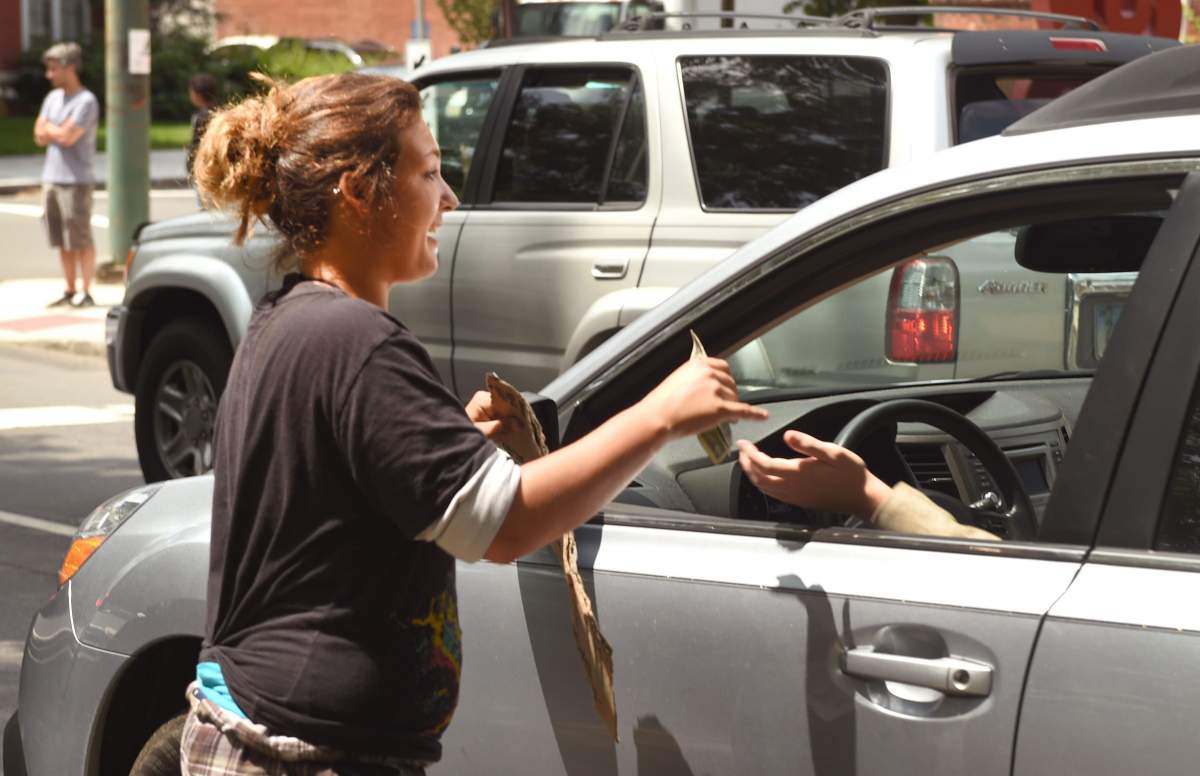An approach to dealing with panhandling at busy intersections in Burlington that involved possibly handing out fines to generous drivers won’t be seeing the light of day.

In a statement, the city of Burlington said its planning and development committee looked at a staff report on panhandling during a meeting on September 10 and, while a motion suggesting a bylaw for ticketing drivers who give money to panhandlers was put forward, it was not actually approved.
The committee did approve a number of actions to tackle panhandling at the side of the road, including educating residents on how they can help those in need through donations to local charities.
The city also said it will continue to work with Halton Regional Police to monitor panhandling and try to inform those who are asking for money about other options.
Burlington Mayor Marianne Meed Ward said she appreciates that, although some media coverage of the issue has resulted in confusion about what the city has actually planned, it has started a national conversation.
“I’m getting calls from as far away as Vancouver,” said Meed Ward. “I was in a call-in show and somebody was calling in from Ottawa. And other places — Kitchener, Toronto of course.
“Every municipality is dealing with this issue. We are all struggling to figure out how to sensitively deal with it. To help the people who need help, but help them in the best way that doesn’t put anybody at risk.”

Get daily National news
She said she has spoken with police about possible options, including whether or not giving money to panhandlers constitutes distracted driving, but said council doesn’t have the authority to issue tickets and ultimately voted down the motion to pursue that avenue.
“The bottom line for me is everyone’s safety is at risk with this practice,” said Meed Ward. “And it’s also not the best way to help people. So let’s turn our minds to how we can actually solve the problem so nobody feels the need to stand in the median, or walk among lanes of traffic — put themselves at risk — to put food in their mouths, clothes on their back and a roof over their head.”
One of Hamilton’s top anti-poverty advocates said there needs to be even more done to address panhandling, although he agreed that education is a positive step.
“I often look at panhandling as a bit of a toll we’re paying in this deeply inequitable society,” said Tom Cooper during an interview on Global News Radio 900 CHML’s Scott Thompson Show. “It’s the price we’re paying for not looking after one another as well as we should be.”
Cooper, who is the director of the Hamilton Roundtable for Poverty Reduction, said he thinks panhandling at intersections is a “very dangerous situation” but added that it’s a symptom of a larger problem.
WATCH: (March 27, 2018) Kelowna’s proposed new busking, panhandling bylaw

“The dilemma is not the individuals who are asking for change and it’s not the drivers who want to do what they can to help out. It’s the fact that our governments aren’t providing enough for the basic necessities.”
“Local communities need to be telling the provincial government that people need more to live on. And if we had some of those governmental solutions, we wouldn’t be seeing the rise in aggressive panhandling.”
Meed Ward agreed with that perspective.
“I believe the government has a huge role to play in this,” she said. “When the basic income pilot was cancelled in Hamilton, that’s going backward. That’s the wrong direction. And clawing back social services is going to create more desperation, and I think that’s what this is — we’re seeing people who are desperate.
“That’s an indictment of society, that we haven’t done enough.”
She added that the city is working with the Halton Poverty Roundtable about communicating with residents about poverty and why their donations will be more impactful when given to organizations that can use it effectively.






Comments